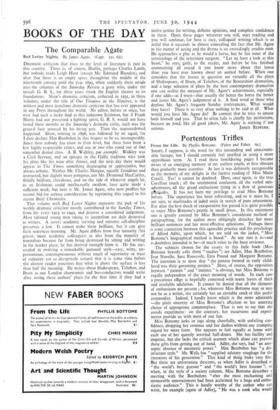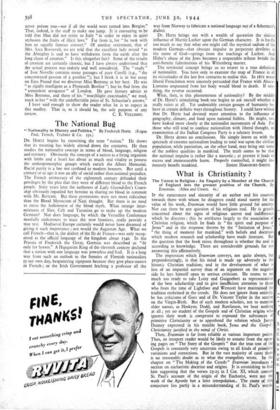Portentous Trifles
From the Life. By Phyllis Bottome. (Faber and Faber. 6s.)
SMART, I suppose, is the word for this astounding and unaccount- able farrago, but I should certainly feel justified in using a more
opprobious term. As I read these bewildering pages I became aware of an emerging memory of my earliest youth, at first obscure then gradually more assertive. At last it was definitely recognisable as the memory of my delight in the furtive reading of Miss Marie Corelli. Yes! it cannot be doubted. Here, once again, is the true Corellian touch ; all the sentimental confusion, all the verbal mis- adventures, all the grand enthusiasm rising in a flow of generous pStiLudes. It has not been my privilege to read Miss Bottome before. The experience has been refreshing, and so it must be, I am sure, to multitudes of jaded souls in search of pure amusement. For after the first shock of exasperation has passed it is quite possible to enjoy Miss Bottome's prattle in small doses._ In this enjoyment one is greatly assisted by Miss Bottome's considerate method of paragraphing, for the author most obligingly detaches her more brilliant sentences and her most effective aphorisms. Perhaps there is some connexion between this agreeable practice and the psychology of Alfred Adler, upon which, we are told on the jacket, "Miss Bottome's biographical method is based." At any rate it is—and is doubtless intended to be—of much value to the busy reviewer.
The subjects chosen for the essays in this little book (Miss Bottome bravely calls them " studies") are Adler, Max Beerbohm, Ivor Novello, Sara Roosevelt, Ezra Pound and Margaret Bottome. The intention is to show that " the pattern formed in early child- hood was their governing instinct." Here, of course, the opposition between " pattern " and " instinct " is obvious, but Miss Bottome is regally independent of the exact meaning of words. In each case a precarious effigy is hopefully cemented with many layers of thick and insoluble adulation. It cannot be denied that all the elements of enthusiasm are present ; for, whatever Miss Bottome may or may not be as a writer, she certainly has an enviable stock of this useful commodity. Indeed, I hardly know which is the more admirable —the plain sincerity of Miss Bottome's affection or her unerring choice of appropriate commonplace. That is not to say that she avoids experiment : on the contrary, her excursions and experi- ments provide us with most of our fun.
Miss Bottome jerks or jogs along cheerfully, with unfailing con- fidence, dropping her commas and her dashes without any cramping regard for mere form. She appears to feel equally at home with each one of her queerly assorted half-dozen. She has facility and impetus, but she lacks the critical acumen which alone can prevent these gifts from -getting out of hand. Adler, she says, had " an anti- septic absence of mesmeric power." Max Beerbohm has "a dis- infectant style." Mr. Wells has "supplied salutary roughage for the intestines of his generation." This kind of thing looks very fine. But there are unfortunate descents, as when Adler is described as " the world's best guesser " and " the world's best listener "; or when, in the style of a society column, Miss Bottome describes a meeting with the Beerbohms " after the most enchanting and memorable entertainment had been acclaimed by a large and enthu- siastic audience." This is hardly worthy of the author who can write, for example (again of Adler), " He was a cook who would
never poison you—not if all the world were turned into Borgias." That, indeed, is the stuff to make one jump. It is reassuring to be told that Max did not retire to Italy " in order to enjoy in quiet seclusion the fruits of illicit love." Far from it, for " he took with him an equally famous consort." Of another retirement, that of Mrs. Sara Roosevelt, we are told that the excellent lady rested " as the Almighty is said to have withdrawn from the earth after the long chaos of creation." Is this altogether fair? Some of the results of creation are certainly chaotic, but I have always understood that the actual process was orderly and well considered. The " study " of Ivor Novello contains many passages of pure Corelli (e.g., " the concentrated passion of a panther "); but I think it is in her essay on Ezra Pound that we discover Miss Bottome at her best. He was " as rigidly intelligent as a Plymouth Brother "; but he fled from the " somnolent arrogance " of London. He gave literary advice to Miss Bottome, and three of his." searchlight exactitudes," we read, stuck in her " with the undeflectable poise of St. Sebastian's arrows." I have said enough to show the reader what he is to expect in this medley. That is, or it should be, the sole purpose of any































 Previous page
Previous page